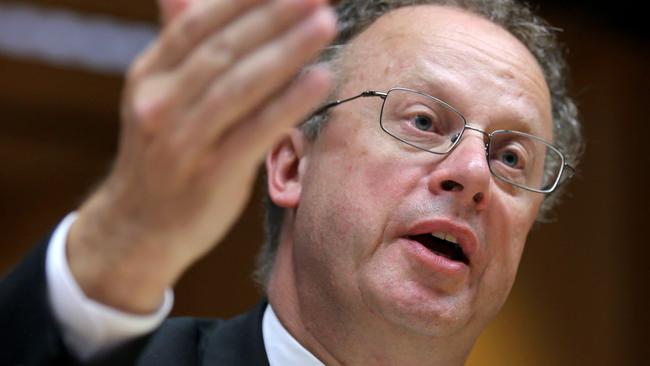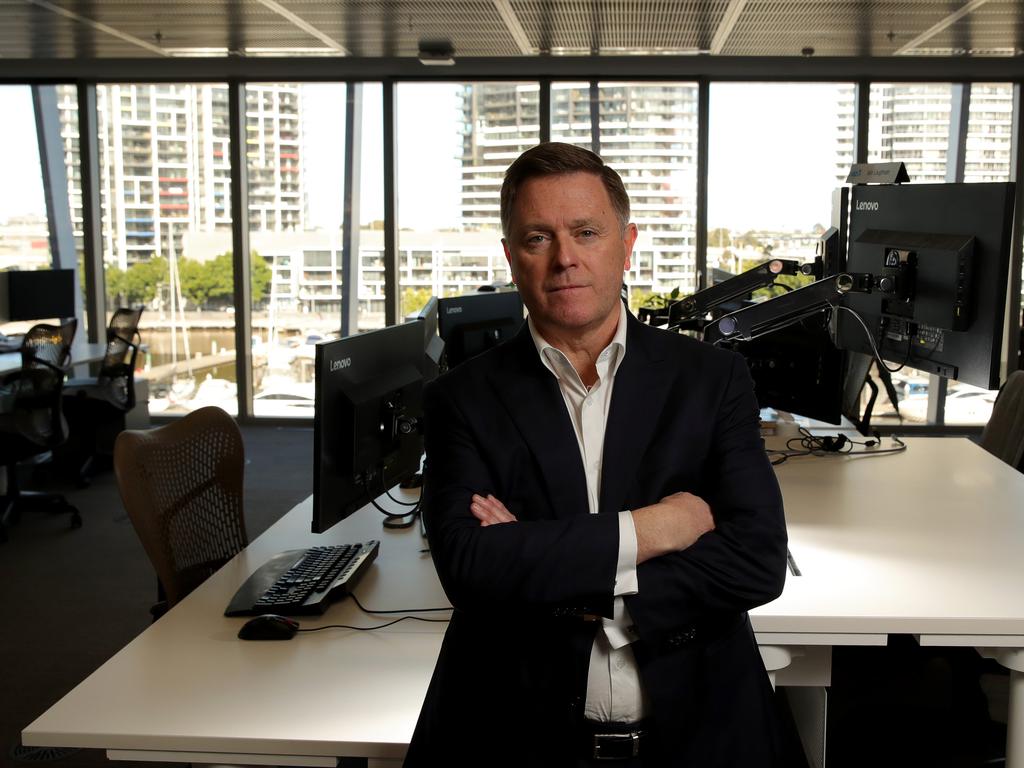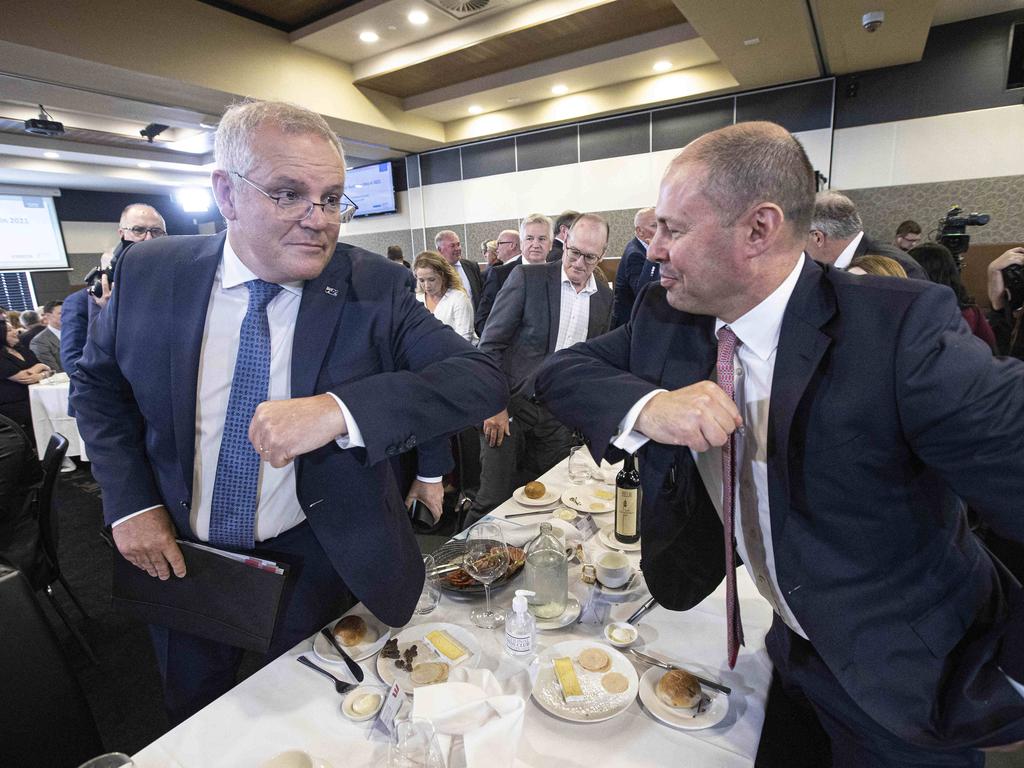Ex-NAB financial chief Mark Joiner embraces climate epiphany
Mark Joiner says the future of the planet hangs in the balance and it’s going to be a bumpy ride.

Mark Joiner’s assessment of several landmark climate developments over the last week, such as the US returning to the Paris Agreement and Rio Tinto’s flip in pledging to work with customers to cut their emissions, is strangely detached.
“Yes, I’m encouraged,” the former National Australia Bank chief financial officer said.
Encouraged? Is that the best he can do?
This is the same executive who tested the patience of NAB’s board and senior management by plotting the introduction of social responsibility to the bank’s competitive model way back in 2010.
Then, four years later while still at the bank, he had a climate epiphany. It’s not that Mr Joiner has become disengaged since then; the problem, as he sees it, is that the future of the planet has largely been determined.
“These things are 1000-year cycles, so what we’re going to experience (with the changing climate) is locked in,” he said.
“The reality is that Australia is heavily invested in the old, carbon-intensive economic model.
“No one really knows what the outcomes will be, but I think it’s going to be incredibly close and a bumpy ride, although not necessarily catastrophic.”
Mr Joiner is a former CFO of global wealth at Citigroup, an ex-NAB banker and now chairman of QBE Asia Pacific.
He has a rare blend of market-based skills enabling him to assess the impact of the changing climate and the enormous human and capital costs of the transition to a low-carbon economy.
His brutal assessment that the risk to the planet has already been determined comes as Scott Morrison seeks to disarm the climate warriors in his party room, giving him room to edge towards a once-heretical commitment of net-zero emissions by 2050 in line with the Paris Agreement.
The Morrison government’s current target is to lower emissions by 26-28 per cent from 2005 levels by 2030.
The Prime Minister’s latest repositioning came early this month when he said it was his “preference” to be carbon-neutral by 2050. This would be achieved through technology rather than new taxes.

The corporate sector, meanwhile, is moving on, with BlackRock chief executive Larry Fink warning 1000 global chief executives of carbon-intensive companies last month that they risked being dumped by the world’s biggest investor if they made “insufficient preparation for the net-zero transition”.
The Australian Securities and Investments Commission has also weighed in, warning directors late last year that climate change was a systemic and foreseeable risk which required “strong and effective” corporate governance practices. Directors who failed to consider climate risks could be found liable for breaching their duty of care and diligence.
Given his background and current role, Mr Joiner was a natural addition to the steering committee of the Australian Sustainable Finance Initiative, which includes more than 80 organisations from the nation’s financial system, including banks, superannuation funds, asset managers, regulators, academics and government.
In mid-November, ASFI released a road map to transform the financial system through the adoption of 37 recommendations.
The overriding objectives are to meet 21st century sustainability challenges, position Australia more competitively within international markets, and prioritise prosperity for all — not just the privileged few — in Mr Joiner’s “bumpy” transition process.
Mr Joiner is emphatic that prosperity for all has to be part of the solution.
He reasons that the people who control the climate remediation model will be spared the sharp edge of adaptation, so the solution demands that the pain be shared.
“We think we’ll be fine in our gated communities and our holiday homes, while people in Bangladesh get flooded and have to migrate because they can’t feed themselves,” Mr Joiner said.
“So we can see it coming but we think it’s not really going to affect us. But it will. Of course it will.”
Mr Joiner traces his climate conversion back to 2010, when he began introducing social responsibility to NAB’s competitive model. About that time, he attended a business lunch and was asked by leading mining industry figure Hugh Morgan if he thought it was his right not to fund coal mines.
Mr Joiner recalls saying no, that the banks had a privileged position, they were licensed by the government, and coal mining was legal and played an important role in the economy.
Banks should therefore avoid imposing their values on society, but they could still “encourage people to move in the right direction”.
Four years later and still at NAB, Mr Joiner’s climate epiphany came while teaching part-time at a local course affiliated with Cambridge University.
At an off-site meeting with Cambridge staff, he took them to task over the complexity of the course’s climate content, saying they should be able to distil it down to a handful of key issues.
When they suggested Mr Joiner might like to perform the task himself, he disappeared for a couple of hours and came back, brandishing a concise, three-point brief. It said, first, that global temperatures were rising too far and too fast, and second, that the world was experiencing a massive loss of biodiversity, making it more vulnerable to a volatile climate.
The third point, which Mr Joiner regards as his main contribution, was that very little would be done about the first two issues in an environment of extreme global inequality.
Now in a non-executive role in the insurance industry, his thoughts have further evolved.
“In my view, we shouldn’t be saying to coal mines: ‘We refuse to insure you. Good luck’,” he said.
“That’s not a just transition, because mines shut down and people lose their jobs. Where’s the justice in that?
“But if we start to say: ‘We’ll insure you but we need you to change these aspects of your business model so you do less harm’, then we can play a role in the transition without starving people into submission.
“You have to share the pain of these things, which means financial institutions weighing up the obligations tied to their privileged position, and leaving enough room for a just transition so new industries can emerge and families aren’t left without incomes.”
Mr Joiner accepts that Australia would make “two-10ths of no difference” if it sacrificed its carbon-intensive economy to the climate gods.
But what of the opportunity cost? By failing to move faster and embrace new industries, Australia effectively spurns the chance to become a renewable energy superpower. An abundance of land and sunshine are among the essential ingredients for wind-and-solar generated electricity to extract hydrogen from water, and then combine it with nitrogen from air to produce the renewable fuel, ammonia, for export.
Ultimately, he believes the nation will have no option but to fall into line and announce a plan to achieve net-zero emissions by 2050. Half the world’s economic output is already generated in countries which are participants in the race to net zero.
If Australia remains an outlier, it faces the prospect of carbon border taxes levied by the European Union and other trading blocs or countries.
Mr Joiner says he always believed that the real pressure for a carbon tax would emerge from trade deals.
“The EU is effectively telling us that if we don’t put a price on our carbon then they will, because at the moment we’re subsidising our industries by using fossil fuels at their expense,” he said.
“So (net zero) is going to happen, whatever the Australian government thinks.
“The markets will impose it on us.”






To join the conversation, please log in. Don't have an account? Register
Join the conversation, you are commenting as Logout